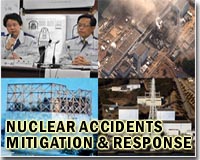| . |  |
. |
Fukushima City, Japan (AFP) May 17, 2011 When other doctors fled, 72-year old Kyohei Takahashi stayed, and hundreds of patients in the tsunami-hit Japanese town of Minamisoma near a crippled nuclear plant will never forget. Dr. Takahashi has defied radiation fears and worked gruelling hours for the past nine weeks to do what he considers his duty. "As a doctor, I thought, I shouldn't retreat," he said. "I told myself: who will do it if I don't?" Takahashi says he decided to keep his clinic open when other doctors closed shop and fled after the Fukushima nuclear power plant, just 25 kilometres (16 miles) south of Minamisoma, was crippled by the March 11 quake and tsunami. "It was utter panic," the doctor recalled. "The telephones didn't work, the shops were closed, people had disappeared and no hospitals were open except this one. The city was completely dead." Takahashi, who specialises in obstetrics and gynaecology, accepted anyone who came for help, mostly elderly people who remained in the stricken city following a government order to stay indoors or evacuate. Together with four clinic workers, he has examined as many as 120 patients a day, many of them suffering pneumonia as they withstood freezing temperatures without electricity, running water or enough food after the disaster. "Doctors are there to work in this kind of adversity," he said. "This is my mission -- maybe it's the last chapter of my medical career." The city turned into a virtual ghost town after the nuclear power plant was engulfed by the monster tsunami triggered by the nation's biggest recorded earthquake, and then rocked by a series of explosions and fires. The atomic plant, some 220 kilometres (135 miles) northeast of Tokyo, has since been belching radioactive materials into the air, soil and ocean in the world's worst nuclear disaster since Chernobyl in 1986. When medicine, oxygen tanks and other medical equipment were running short, Takahashi called everyone he could think of, including the office of Prime Minister Naoto Kan in Tokyo. Working any contact he could, Takahashi scratched by, securing drugs and medical equipment from personal contacts and the Self-Defence Forces. His efforts inspired others. "At one stage I ran away, but I decided to return home because Dr.Takahashi was staying here," said Yaeko Aihara, 74, who visited the clinic for treatment of an ailment. "We definitely need doctors amid this kind of hardship." Since the disaster, foreign medical teams have also arrived. Among them is a Thai medical team that has partnered with Fukushima Medical University and is working with Japanese counterparts to prevent infectious diseases among children in shelters, officials said. The first foreign medical team to arrive were two doctors and two nurses from Jordan who in late April joined Japanese medical workers in examining people in shelters. They were checking evacuees' conditions with ultrasonic equipment and made their diagnoses through interpreters at a school gymnastics hall in Minamisoma, a centre for people evacuated from the no-go zone around the plant. "People here are suffering because they have left their homes and are now staying with too many people in a limited area," said Omar Nayel Zubi, a 50-year-old Jordanian doctor. Mohammed Rashaideh, his colleague and fellow-countryman, said: "On many occasions, the Japanese government and people have helped us back in Jordan. We have to pay them back and we help them as much as we can." The 34-year-old Jordanian said he was not worried about radiation from Fukushima. "Radiation levels are quite low, even in this area, only 25 kilometres away from the accident," he said. "No one should be worried. People should not overreact." Shinya Takase, the Japanese doctor heading the joint team, said their medical support not only helped improve evacuees' health but also encouraged local people who were traumatised by nuclear fears. "They came here with high ambitions and helped us a lot," said Takase. "Their appearance in Fukushima is meaningful. "They have proved that medical activities can be carried out safely here. It is significant that foreign doctors joined our team." Kazuya Murata, a 70-year-old evacuee, said: "They came here from the other side of the Earth. We thank them a lot. And I was relieved that I'm in good health because of the experts."
Share This Article With Planet Earth
Related Links Bringing Order To A World Of Disasters A world of storm and tempest When the Earth Quakes
 Japan's nuclear crisis timetable on track: PM
Japan's nuclear crisis timetable on track: PMTokyo (AFP) May 16, 2011 Japan said Monday it was still on target to achieve the shutdown of damaged reactors at a crippled nuclear plant by around the year-end, despite damage being worse than earlier thought. "We will manage to continue working without changing the timeline prospects of putting (the reactors) in to a state of cold shutdown in six to nine months" from April 17, Prime Minister Naoto Kan said in par ... read more |
|
| The content herein, unless otherwise known to be public domain, are Copyright 1995-2010 - SpaceDaily. AFP and UPI Wire Stories are copyright Agence France-Presse and United Press International. ESA Portal Reports are copyright European Space Agency. All NASA sourced material is public domain. Additional copyrights may apply in whole or part to other bona fide parties. Advertising does not imply endorsement,agreement or approval of any opinions, statements or information provided by SpaceDaily on any Web page published or hosted by SpaceDaily. Privacy Statement |